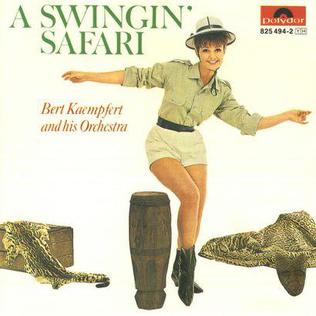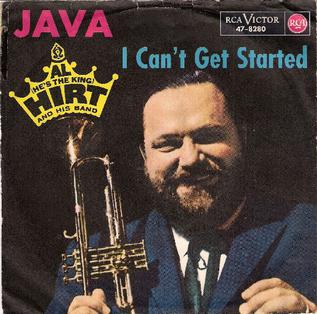
Bert Kaempfert was a German orchestra leader, multi-instrumentalist, music producer, arranger, and composer. He made easy listening and jazz-oriented records and wrote the music for a number of well-known songs, including "Strangers in the Night", “Danke Schoen” and "Moon Over Naples".
Guy Warren of Ghana, also known as Kofi Ghanaba, was a Ghanaian musician, most notable as the inventor of Afro-jazz — "the reuniting of African-American jazz with its African roots" — and as a member of The Tempos, alongside E. T. Mensah. He also inspired musicians such as Fela Kuti. Warren's virtuosity on the African drums earned him the appellation "The Divine Drummer". At different stages of his life, he additionally worked as a journalist, DJ and broadcaster.

"Strangers in the Night" is a song composed by Bert Kaempfert with English lyrics by Charles Singleton and Eddie Snyder. Kaempfert originally used it under the title "Beddy Bye" as part of the instrumental score for the movie A Man Could Get Killed. The song was made famous in 1966 by Frank Sinatra.
Frank Mills is a Canadian pianist and recording artist, best known for his solo instrumental hit "Music Box Dancer".
"It's Magic" is a popular song written by Jule Styne, with lyrics by Sammy Cahn, published in 1947. They wrote the song for Doris Day in her Warner Brothers film debut, Romance on the High Seas. In the autumn of 1948 Vic Damone, Tony Martin, Dick Haymes, Gordon MacRae and Sarah Vaughan all charted on Billboard magazine charts with versions of the song, but none as successfully as Day's recording. "It's Magic" received an Academy Award nomination for Best Song, but in March 1949 lost to "Buttons and Bows" by Jay Livingston and Ray Evans.

"Red Roses for a Blue Lady" is a 1948 popular song by Sid Tepper and Roy C. Bennett. It has been recorded by a number of performers. Actor-singer John Laurenz (1909–1958) was the first to record the song for Mercury Records. It rose to #2 on the weekly “Your Hit Parade” radio survey in the spring of 1949. The original 78rpm single was issued on Mercury 5201 - Red Roses For A Blue Lady by John Laurenz.

"Surfin' Safari" is a song by American rock band the Beach Boys, written by Brian Wilson and Mike Love. Released as a single with "409" in June 1962, it peaked at number 14 on the Billboard Hot 100. The song also appeared on the 1962 album of the same name.
"Too Marvelous for Words" is a popular song written in 1937. Johnny Mercer wrote the lyrics for music composed by Richard Whiting. It was introduced by Wini Shaw and Ross Alexander in the 1937 Warner Brothers film Ready, Willing, and Able, as well as used for a production number in a musical revue on Broadway. The song has become a pop and jazz standard and has been recorded by many artists.
"Let a Smile Be Your Umbrellas" is a popular song.
"Nut Rocker" is an instrumental rock single recorded by American instrumental ensemble B. Bumble and the Stingers that reached number 23 in the U.S. Billboard Hot 100 in March 1962 and went to number 1 in the UK Singles Chart in May 1962. It is a version of the march from Tchaikovsky's 1892 ballet The Nutcracker.

"A Swingin' Safari" is a 1962 instrumental composed by Bert Kaempfert, using his alias, Bernd Bertie. It was recorded by Kaempfert on Polydor Records and released in the United States on Decca Records. The song features a distinctive main theme played on the piccolo as substitute for the traditional tin whistle, and a trumpet solo by Manfred "Fred" Moch. The prominent bass line is by Ladi Geisler. Kaempfert's recording of the song did not reach the charts, but a near-simultaneous cover by Billy Vaughn reached #13 on the U.S. Billboard Hot 100 and No. 5 on the Easy Listening chart.
"What's New?" is a 1939 popular song composed by Bob Haggart, with lyrics by Johnny Burke. It was originally an instrumental tune titled "I'm Free" by Haggart in 1938, when Haggart was a member of Bob Crosby and His Orchestra. The tune was written with a trumpet solo, meant to showcase the talents of band-mate Billy Butterfield. Crosby's orchestra recorded "I'm Free" the same day it was written.

"Wonderland by Night" is a popular song by Bert Kaempfert that was a Billboard number one hit for three weeks, starting January 9, 1961. Written by Klaus Günter Neumann with English lyrics by Lincoln Chase, it was recorded in July 1959 and became Bert Kaempfert's first hit with his orchestra. The song featured Charly Tabor on trumpet. "Wonderland by Night" also crossed over to the R&B chart where it peaked at number five.
"Moon Over Naples" is a 1965 instrumental composed and recorded by German bandleader Bert Kaempfert. The instrumental version reached No. 6 on Billboard's Adult Contemporary chart. It won a BMI Award in 1968.

"Java" is an instrumental adaptation from a 1958 LP of piano compositions, The Wild Sounds of New Orleans, by Tousan, also known as New Orleans producer/songwriter Allen Toussaint. As was the case of the rest of Toussaint's LP, "Java" was composed in studio, primarily by Toussaint.

Those Were the Days is an album by American pop singer Johnny Mathis that was released on November 6, 1968, by Columbia Records. It followed the formula of including covers of recent hit songs, the oldest, in this case, being "The End of the World", which hadn't been on the charts since 1963. Two of the 10 tracks, however, had not been released as singles by other artists: "Every Time I Dream of You", which had appeared as an instrumental on Bert Kaempfert's 1967 album Love That Bert Kaempfert, and "You Make Me Think About You", which was first heard in the 1968 film With Six You Get Eggroll.

Johnny Mathis Sings the Music of Bacharach & Kaempfert is an album by American pop singer Johnny Mathis that was released in the fall of 1970 by Columbia Records. While one half of the two-record set was a compilation of tracks from his previous albums that were composed by Burt Bacharach, the other consisted of new recordings of songs composed by Bert Kaempfert, including a new version of "Strangers in the Night", which Mathis had already recorded in 1966 for his LP Johnny Mathis Sings. Although the Kaempfert tribute was similar to recent Mathis albums in that he was mainly covering songs made popular by other singers, it was absent of hits from the 12 months previous to its release that had become the pattern of his output at this point. The latest US chartings of any of the Kaempfert compositions as of this album's debut came from 1967 recordings of "Lady" by Jack Jones and "The Lady Smiles" by Matt Monro.

Greatest Hits is a live album by American pop singer Andy Williams that was digitally recorded live in concert at the Andy Williams Moon River Theater in Branson, Missouri and released by the LaserLight division of Delta Music Inc. in 1994. It includes performances of songs that he had previously recorded during his time with the Cadence and Columbia labels as well as one he had never recorded before -- "L-O-V-E", which Nat King Cole took to number 81 pop and number 17 Easy Listening in Billboard magazine in 1964.

Unforgettable – A Musical Tribute to Nat King Cole is a soundtrack album released in the UK in 1983 by the CBS Records division of Columbia in conjunction with the broadcast of American pop singer Johnny Mathis's BBC television concert special of the same name that featured Cole's daughter Natalie. The front of the original album jacket credits the concert performers as "Johnny Mathis and Natalie Cole", whereas the CD booklet reads, "Johnny Mathis with special guest Natalie Cole".

"Traces" is a 1968 song by the American rock band Classics IV. Released as a single in January 1969, the cut served as the title track off the album of the same name. Written by Buddy Buie, J. R. Cobb, and Emory Gordy Jr., the song peaked at No. 2 on 29 March 1969 on the Hot 100, as well as No. 2 on the Easy Listening music charts, making it the highest-charting single by the Classics IV. The song is noted for its use of an oboe, heard in the introduction, as well as a string section.











